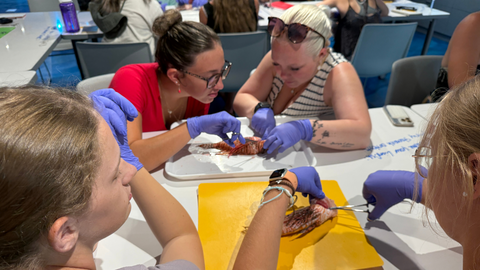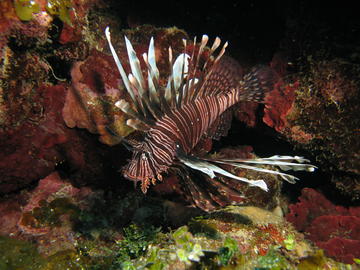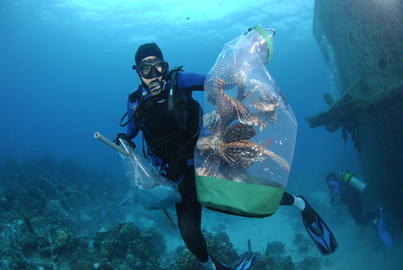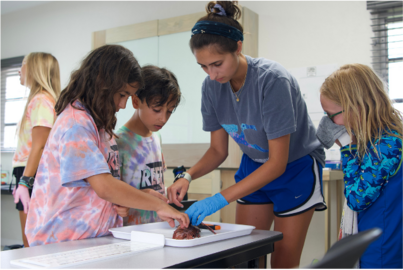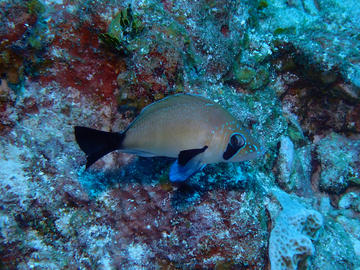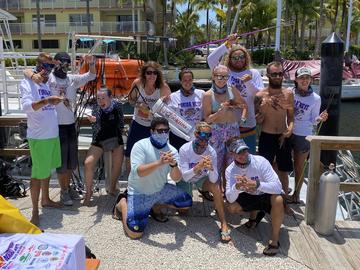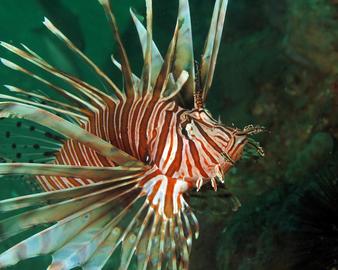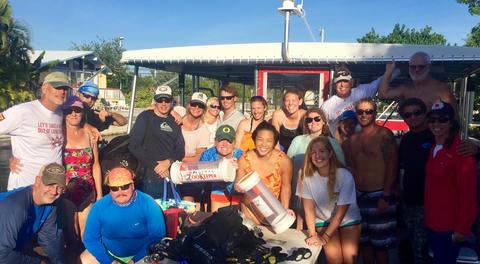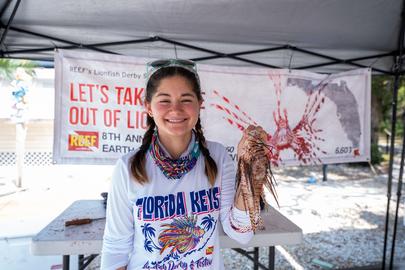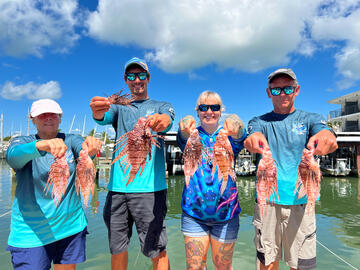REEF Ocean Explorers Programs offer a wide range of hands-on learning opportunities that promote curiosity and environmental stewardship. From fish identification to interactive lab activities, these programs are designed to bring marine science to life for students of all ages. One of our most popular programs is an invasive lionfish investigation and dissection. During these sessions, REEF staff lead participants through an engaging, hands-on exploration of this invasive predator.
Current search
Search found 123 items
- INVASIVE
- (-) Remove e-News article filter e-News article
- (-) Remove amylee714 filter amylee714
Exotic and invasive species are those that are not native to an area, but have been brought in through human activities. Non-native marine fishes can pose a major threat to fisheries, habitats, native species, and overall ecosystem function. The REEF Invasive Species Program uses conservation science, research, education, and community outreach to raise awareness about these threats. Here are four ways you can get involved:
We are now accepting registrations for our Invasive Lionfish Trip aboard the Belize Aggressor III on June 8-15, 2019. This trip will be led by Invasive Species Program Coordinator, Alli Candelmo, Ph.D., and Education Program Manager, Ellie Splain. This Invasive Lionfish Trip is part of REEF’s ongoing effort to monitor the establishment and consequences of invasive lionfish on native fish populations and reef ecosystems.
We just wrapped up hosting the Florida Keys Lionfish Derby and Arts Festival, and now our education team is ready to dive in to a busy season of Ocean Explorers Education programs. While some of the lionfish caught during the derby are immediately prepared into delicious, fresh lionfish ceviche for derby attendees, we also save some lionfish to use during REEF's invasive species-focused education programs throughout the year.
REEF Fishinars are fun, live, interactive webinars, open to anyone who wants to learn about ocean life. We hope you can join one of our upcoming sessions!
Unique Fish of the Cayman Islands: Join REEF’s Director of Science, Christy Semmens, on Wednesday, Sept. 4 at 8pm Eastern to learn more about some of the unique and interesting fish that you can find while diving in the Cayman Islands.
The REEF Conservation Challenge is a way to earn stickers while participating in REEF programs. This month, in honor of the 13th annual Florida Keys Lionfish Derby & Festival, we're highlighting the Invasive Species Challenge. There are several ways to complete this challenge and earn the accompanying sticker, and one way is to participate in a REEF Lionfish Derby. If you're in the Florida Keys or South Florida, check out the Florida Keys Lionfish Derby & Festival this weekend in Islamorada.
First sighted in Lebanon in 2012, invasive lionfish have since become well-established in the Mediterranean Sea. In an effort to provide policy recommendations for the lionfish invasion within the Mediterranean Sea, REEF joined in a global collaborative effort with researchers from Europe, Asia, Africa, North America, and the Caribbean to share successes and failures from two decades of lionfish management in the Western Atlantic.
Although our 2018 Summer Lionfish Derby Series has come to a close, REEF is continuing invasive lionfish education and removal efforts through Collecting and Handling Workshops throughout southern Florida. The goal of the workshops is to educate the public about the invasive lionfish, as well as practice safe removal methods and provide participants with permits issued by the Florida Keys National Marine Sanctuary for removal of lionfish in the Sanctuary Preservation Areas using hand nets only.
Fourteen teams of divers persevered through windy conditions to bring in 494 invasive lionfish during the 2021 REEF Earth Day “Locals” Lionfish Derby. Teams were permitted to fish in Monroe County waters from sunrise to sunset on Saturday, April 24. More than $2,500 in cash and prizes was awarded to teams who brought in the most, largest, and smallest lionfish.
Last month, 22 teams of scuba divers took to the water and collected 1,898 invasive lionfish during the 14th Annual REEF Florida Keys Lionfish Derby & Festival. Derby teams fished from sunrise to sunset on Friday, Sept. 8 and Saturday, Sept. 9. On Sunday, Sept. 10, participants gathered at Postcard Inn Beach Resort & Marina in Islamorada for a community celebration. The festival featured lionfish tastings, cooking and dissection demos, games, interactive booths, and live music.

